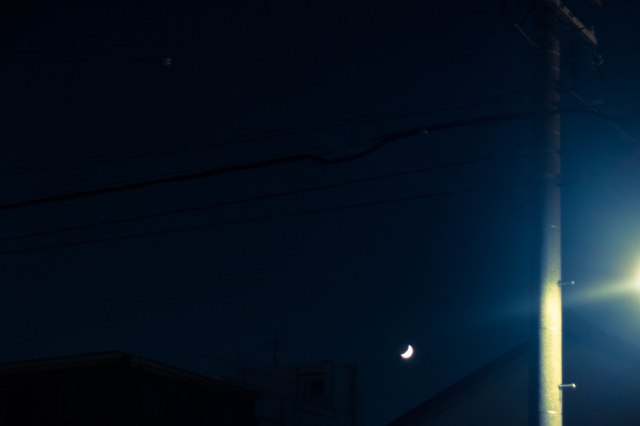Today, I created a new blog, Kamakura Mirror Micropoetry for haiku, tanka and other short poetry.
Archive for October, 2014
It’s good I added Nagoya to my tags for my review of Haruki Murakami’s newest novel. Your blog reminds me of arriving in Japan and taking in all the new sights and sounds when I was 18.

The street lights may block out the stars but the moon rabbit is forever peeking out at us.
Although next week there will be a lunar eclipse!
This photo is taken over the houses of my new neighbourhood in Nagoya, Japan. I’m getting settled in now, and I’m very excited to be exploring the area over the next few months.
For more information about the weekly photo challenge, click here.
(photo from http://www.famousauthors.org)
Kobo Abe’s novels as well as Franz Kafka’s novels come to mind when I think of the universality and genius of Murakami. The majority of Haruki Murakami’s novels are stripped of familiar culture and sensibilities of the Japanese, but Norwegian Wood (1987) and Colorless Tsukuru Tazaki and his Years of Pilgrimage (2014) are full of associations with modern Japanese.
Murakami’s newest novel impacted me more than all his other novels, except Norwegian Wood. I felt such a familiarity and nostalgia of Japanese sensibilities within the pages he wrote. Norwegian Wood was inspired by Murakami’s life as a student at Waseda University. I read it remembering my experience as an international student at Waseda at the same time Murakami was there. His new book is populated by a younger generation in Nagoya, but the sensitivity of the characters are true to my experience, also.
Tsukuru Tazaki’s four best friends inexplicably broke with him at the end of their college years. After falling into a depression, a woman and a younger man gave him some clues to what he needs to do. Nudged by the woman, he sets out to meet his four old friends, and finds it was an excruciating secret and an abominable lie that caused Tsukuru to be shut out of their lives. His ‘pilgrimage’ is to find some sense out of what happened, and ends with him visiting three of his old friends, and traveling to Sweden
In Nagoya, Ao (Blue) confessed to Tsukuru, “You know, in a sense we were a perfect combination, the five of us. Like five fingers,” he added. “The five of us all naturally made up for what was lacking in the others, and totally shared our better qualities. I doubt that sort of thing will ever happen again in our lives.” Ao concluded by saying that he does not have the same spontaneous, pure feeling for his family.
After meeting Aka (Red) and Ao (Blue) in Nagoya, and then traveling to Sweden to see Kuro (Black), Tsukuru was able to find understanding: “One heart is not connected to another through harmony alone. They are, instead, linked deeply through their wounds.”

